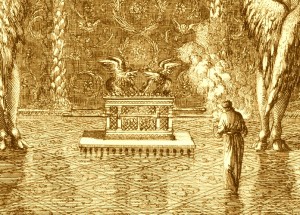Several years ago I woke up in the morning with a back pain so intense I couldn’t walk, sit or stand. A disk in my lumbar spine had ruptured. It was so bad, in fact, that it concerned the doctors that permanent nerve damage may result if something wasn’t done to repair it quickly.
They recommended emergency surgery. Emergency neurosurgery.
It sounded scary. They were going to enter my back, remove part of one vertebrae and carefully clear away the part of the disk which was pushing on my spinal cord and sciatic nerve.
“We’re going to be working in close proximity to your spinal cord, and within the fluid that surrounds your brain and spinal cord,” they told me. “While infection is always a risk with surgery,” the doctor continued, “it’s especially risky because an infection in your spinal fluid could result in brain damage.”
 I got the point. So when they asked me to shower several times with special soap, wear a fancy blue suit, and have my back shaved and scrubbed again by a highly trained nurse… I was all cooperation, because I wanted full assurance that my surgery would be safe. I wanted to go into surgery with confidence that I would be coming out.
I got the point. So when they asked me to shower several times with special soap, wear a fancy blue suit, and have my back shaved and scrubbed again by a highly trained nurse… I was all cooperation, because I wanted full assurance that my surgery would be safe. I wanted to go into surgery with confidence that I would be coming out.
Hebrews 10:22 invites us to draw near to God with a sincere heart, but when it also invites us to draw near to God with the full assurance that comes from faith, I understand the risk that was implied. For the Hebrews, it was the only way to approach God.
“Let us draw near to God with a sincere heart and with the full assurance that faith brings, having our hearts sprinkled to cleanse us from a guilty conscience and having our bodies washed with pure water.”
This passage mentions two methods of preparation for us as we draw near to God: having our hearts sprinkled to cleanse us from a guilty conscience, and having our bodies washed with pure water.
These are both references to the Jewish purification rituals required to prepare to enter the presence of God.
 In the first, the high priest would take the blood from an animal sacrifice and sprinkle it on the mercy seat, the part of the altar where the presence of God dwelt.
In the first, the high priest would take the blood from an animal sacrifice and sprinkle it on the mercy seat, the part of the altar where the presence of God dwelt.
But see this beautiful change in this picture: now it is sprinkled on our hearts. Not on a seat or on a place or in a room. It is sprinkled on our hearts. It is clear the blood of Christ cleanses us from sin and guilt, but the author is also making it clear that the new dwelling place of God is within those who believe—in our hearts.
The author also says that we can draw near with full assurance since our bodies were washed with pure water.
Anyone who was to enter the temple or the tabernacle who had been made unclean by a various and extensive list of contaminates, must wash first.
And this connection is certainly referring to the spiritual reality that when we are made new in Christ, the need for the repeated and ritual washing which was common for the Jews, is gone. Now, once for all, Christ’s blood is enough.
So, it says, we draw near with full assurance that comes from faith in that.
When all this washing and sprinkling was complete, the high priest would have a rope tied around his leg before he entered the Holy of Holies. The thinking was that this was a good idea, just in case the priest was struck dead by some unfortunate misstep during ritual washing. If it happened and they had to retrieve the body, they could pull him out without someone else having to enter.
You see, all the ritual and all the animal sacrifice they could do did not offer them the confidence to walk boldly before the throne of God.
But get this: we can have that kind of confidence. We don’t need a rope around our leg; we can draw near to God with full assurance that comes from our faith in Jesus Christ.
